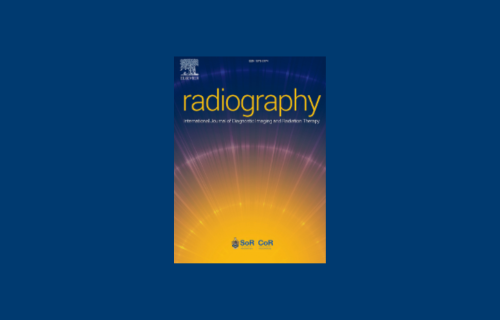From stage to practice: Theatre-based learning as a tool to advance equality, diversity, and inclusion in radiography education
Tuesday, 4 November, 2025
Share

A collaboration between members of the UCD School of Medicine Equality, Diversity and Inclusion (EDI) Committee and Radiography staff within the School, has led to a published paper in Radiography.
The paper is focused on a theatre-based educational intervention delivered to Radiography students. (opens in a new window)Pluto Play Productions—a UK-based theatre group—visited UCD to perform two plays focused on medical health and social care themes. The UCD research team included: Assist Prof Michelle O’Connor, Assist Prof Marion Maher, Assist Prof Nia Clendennen, Associate Prof Anne Doherty, Prof Louise Rainford, Assist Prof Eoin Brennan and Assistant Prof Marie-Louise Ryan.
The performances were presented to cohorts of Radiography students and academic staff, with approximately 170 attendees in total. To evaluate the educational impact and assess students’ understanding of EDI, pre- and post-event surveys were conducted. The experience was overwhelmingly positive for students and staff, with students reporting greater EDI understanding and interest in further learning through performance-based methods.
Abstract
Introduction
Equality, diversity, and inclusion (EDI) are essential in healthcare education, yet traditional didactic methods often lack the emotional engagement needed to promote empathy and behavioural change. Theatre-Based Learning (TBL), using live performance to explore complex themes, offers a promising alternative. Its impact on radiography students, however, is underexplored.
Methods
This study, conducted at an Irish university, featured two EDI-focused theatre performances: Hello, My Name Is and Voices Amplified, followed by facilitated discussions. Radiography students and educators completed pre- and post-intervention online surveys assessing EDI attitudes, perceived learning, and motivation to support EDI initiatives. Quantitative data were analysed using descriptive and inferential statistics; qualitative responses were thematically analysed.
Results
Of 155 participants completing the baseline survey; 118 and 45 completed post-intervention surveys for the respective plays. Students reported significantly greater post-intervention gains than educators in EDI understanding (p = 0.002), self-reflection (p = 0.032), and motivation (p < 0.001). Both plays were highly rated for their effectiveness in humanising EDI concepts. Themes included patient-centred care, healthcare professionals’ impact on the patient experience, and the imperative to address EDI in practice. Younger students (<25 years) favoured theatre-based learning, and female students valued EDI education more strongly.
Conclusion
Observational theatre-based learning is an effective, emotionally engaging tool for enhancing EDI learning in radiography education. It fosters empathy, reflection, and inclusive attitudes.
Implications for practice
Findings support integrating theatre-based learning into healthcare education to strengthen EDI awareness and encourage inclusive practice among future radiographers.
To read the full paper online, visit (opens in a new window)here.